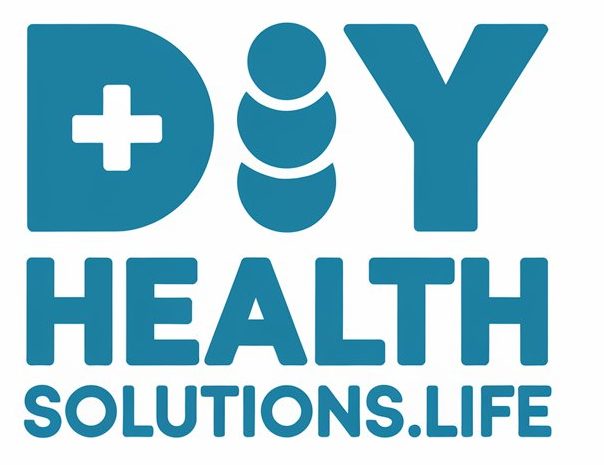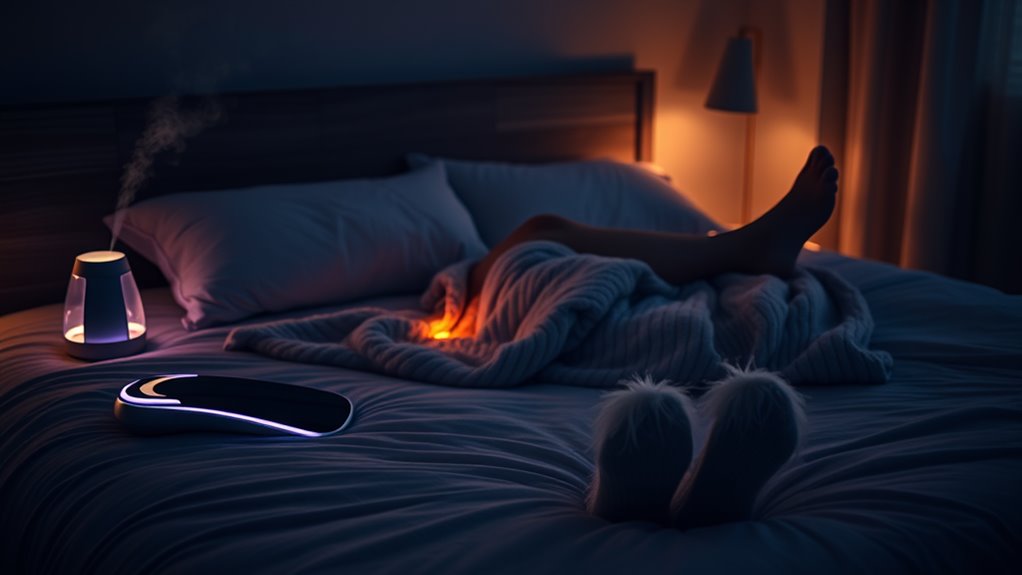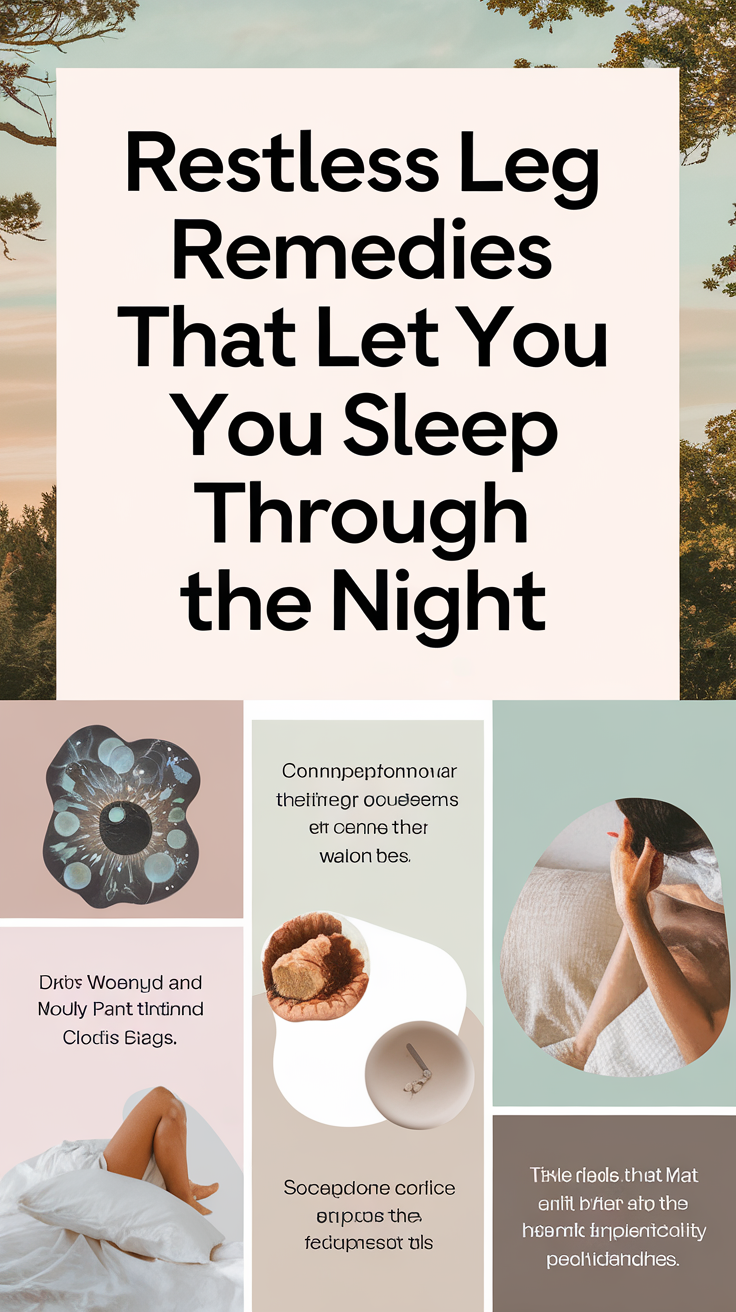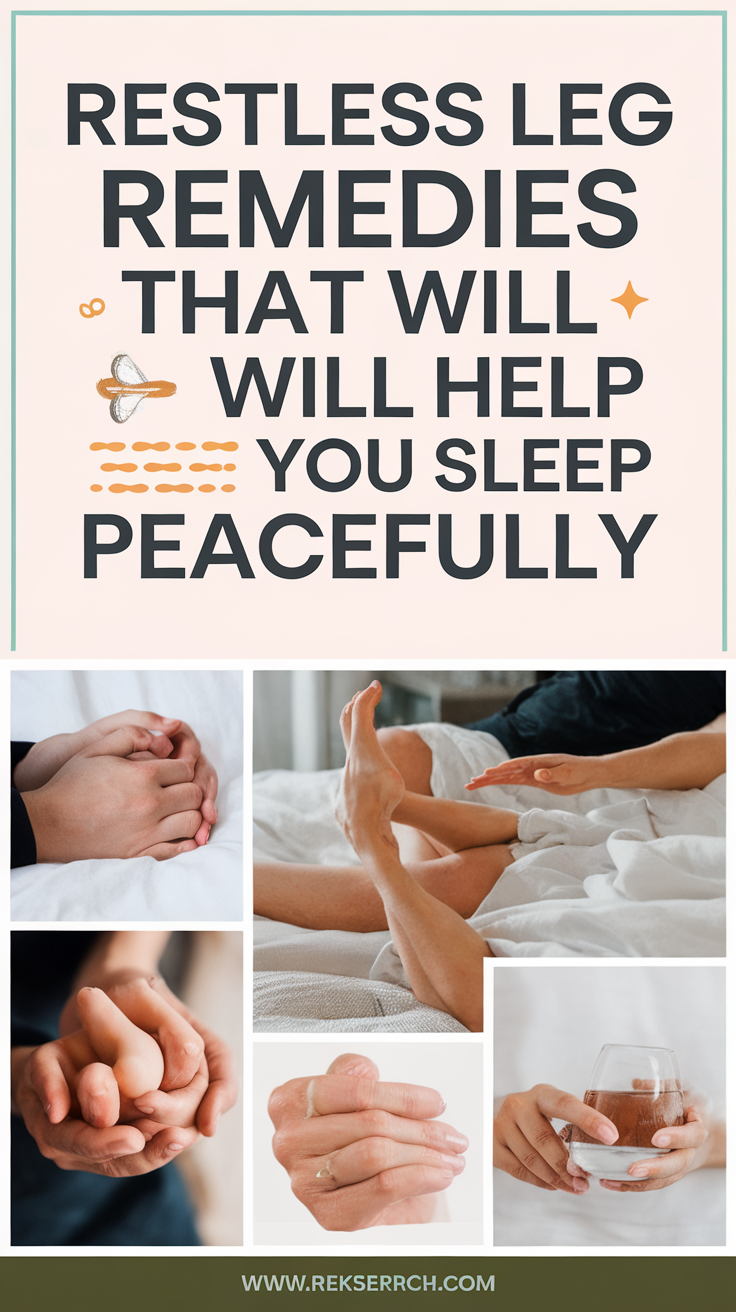Instant Relief for Restless Legs at Night
To find instant relief for restless legs at night, try applying a warm compress to your legs for 15-20 minutes to relax the muscles. Gentle leg stretches or yoga poses before bedtime can also help alleviate discomfort. Additionally, consider increasing your intake of iron-rich foods and reducing caffeine and alcohol, especially in the evening. Establishing a consistent sleep schedule can improve your body’s response to symptoms. Staying hydrated is essential, too. These quick fixes can enhance your comfort, and there’s more effective advice available to help you manage restless legs for better sleep.
Key Takeaways
- Apply warm compresses on your legs for 15-20 minutes to relax muscles and alleviate sensations.
- Try gentle leg stretches or yoga poses before bed to reduce discomfort and promote relaxation.
- Consider herbal remedies like valerian root or passionflower for their calming effects on the nervous system.
- Increase iron-rich foods in your diet, such as spinach and lean meats, to combat potential deficiencies contributing to RLS.
- Establish a consistent sleep schedule to help regulate your body’s internal clock and improve overall sleep quality.
Understanding Restless Legs Syndrome
Restless Legs Syndrome (RLS) is a neurological condition that causes an uncontrollable urge to move your legs. This urge often emerges during periods of inactivity, particularly in the evening or at night, making it difficult for you to relax or sleep.
Understanding RLS starts with symptom identification. You might experience creeping, crawling, or tingling sensations in your legs, which can be temporarily alleviated by movement.
Neurological factors play a significant role in RLS. Research indicates that dopamine dysfunction in the brain may contribute to the condition, as dopamine is vital for regulating movement. Additionally, genetic factors could influence your susceptibility to RLS. If you have a family history of the condition, you may be at a higher risk.
Identifying symptoms early on is essential for managing RLS effectively. If you notice these sensations disrupting your daily life or sleep patterns, it’s important to consult a healthcare professional.
They can help you understand the neurological factors involved and guide you toward appropriate treatment options. Recognizing these elements can empower you in your journey to find relief from RLS symptoms.
Common Triggers and Causes
Understanding the root causes of Restless Legs Syndrome (RLS) can help you manage your symptoms more effectively. Various triggers and causes can contribute to your discomfort at night. Recognizing these factors can guide you toward better sleep hygiene and dietary adjustments.
Here are some common triggers to contemplate:
-
Iron Deficiency: Low iron levels in your body can lead to RLS symptoms. Make sure to monitor your iron intake.
-
Caffeine and Alcohol: Consuming these substances, especially in the evening, may exacerbate your symptoms. Try limiting your intake.
-
Medications: Certain medications, such as antihistamines or antidepressants, can trigger RLS. Consult your healthcare provider if you suspect this.
-
Sedentary Lifestyle: Prolonged inactivity can worsen RLS symptoms. Incorporating regular physical activity into your routine may help.
Quick Home Remedies
Finding relief from the discomfort of Restless Legs Syndrome can often be achieved with simple home remedies. One effective approach is to apply warm compresses to your legs. The heat can help relax your muscles, easing the sensations that come with restless legs. Just soak a cloth in warm water, wring it out, and place it on the affected areas for 15-20 minutes.
You might also consider herbal remedies, as certain herbs can provide comfort. Valerian root and passionflower are known for their calming properties. You can brew these herbs into a tea or take them in supplement form. However, it’s important to consult a healthcare provider before trying new supplements to verify they’re safe for you.
Stretching exercises before bedtime can also help reduce discomfort. Try gentle leg stretches or yoga poses to promote relaxation.
Finally, maintaining a consistent sleep schedule can make a difference in how your body responds to restless legs. By incorporating these quick home remedies, you can find immediate relief and improve your overall quality of sleep.
Lifestyle Changes for Relief
Making certain lifestyle changes can greatly alleviate the symptoms of Restless Legs Syndrome. By adopting healthier habits, you’ll find relief and improve your overall well-being. Here are four key adjustments you can make:
- Dietary Adjustments: Incorporate more iron-rich foods like spinach, beans, and lean meats into your meals.
Reducing caffeine and alcohol intake can also help ease symptoms, as these substances may exacerbate discomfort.
- Sleep Hygiene: Create a consistent sleep schedule by going to bed and waking up at the same time every day.
This helps regulate your body’s internal clock, promoting deeper, more restful sleep.
- Stay Hydrated: Drink plenty of water throughout the day.
Dehydration can worsen symptoms, so aim for at least eight glasses daily.
- Limit Screen Time: Reduce exposure to screens before bed.
The blue light emitted by phones and computers can interfere with your ability to fall asleep and stay asleep.
Implementing these lifestyle changes can make a significant difference in managing Restless Legs Syndrome, helping you enjoy more restful nights.
Stretching and Exercise Techniques
Incorporating stretching and exercise techniques into your daily routine can considerably reduce the discomfort associated with Restless Legs Syndrome. Engaging in regular physical activity helps improve blood circulation and relaxes your muscles, which can alleviate symptoms.
Start with simple leg stretches. Standing or sitting, extend one leg out and reach toward your toes, holding the stretch for 15-30 seconds. Repeat on the other side. You can also try calf stretches by standing on the edge of a step and lowering your heels, holding for a count of 20.
Yoga poses can be particularly beneficial. Poses like the Legs-Up-the-Wall pose help with circulation and relaxation. You can also try the Child’s Pose to relieve tension in your legs and lower back.
Incorporate these techniques into your evening routine, ideally before bedtime, to maximize their effect. Aim for at least 15-30 minutes of stretching or gentle exercise daily.
When to Seek Medical Help
While stretching and exercise can offer significant relief from Restless Legs Syndrome, there are times when it’s important to seek medical help. If you experience persistent symptoms that interfere with your daily life or sleep, consulting a healthcare professional is essential for proper symptom assessment and exploring effective treatment options.
Consider seeking medical help if:
-
Your symptoms are severe and disrupt your sleep regularly.
-
You experience new or worsening symptoms that don’t respond to self-care strategies.
-
You notice leg swelling, pain, or other unusual symptoms that could indicate a separate condition.
-
You have a family history of neurological disorders or other related health issues.
A healthcare provider can conduct a thorough evaluation, helping to rule out other conditions and discuss potential treatment options, which may include medications or lifestyle adjustments.
Don’t hesitate to reach out for help; addressing Restless Legs Syndrome early can lead to better management and improved quality of life.
Frequently Asked Questions
Can Diet Affect Restless Legs Syndrome Symptoms?
Yes, diet can markedly affect restless legs syndrome symptoms. By making dietary changes and increasing your magnesium intake, you might reduce discomfort. Focus on incorporating magnesium-rich foods for potential improvements in your symptoms.
Are There Specific Vitamins That Help With Restless Legs?
Certain vitamin deficiencies, particularly in iron, magnesium, and folate, can exacerbate restless legs syndrome. You might consider supplement recommendations like iron or magnesium to help alleviate symptoms, but consult a healthcare professional before starting any new supplements.
Is Restless Legs Syndrome Hereditary?
You know how family trees sometimes reveal unexpected branches? Restless legs syndrome can be hereditary, influenced by genetic factors. If you’ve got a family history of it, you might be more prone to experiencing symptoms yourself.
Can Meditation Help Relieve Restless Legs at Night?
Yes, meditation can help relieve restless legs at night. By practicing mindfulness techniques and guided imagery, you can reduce anxiety and promote relaxation, which may alleviate symptoms and improve your overall sleep quality.
What Role Does Caffeine Play in Restless Legs Syndrome?
Caffeine consumption can negatively impact sleep quality, potentially exacerbating restless legs syndrome symptoms. Reducing caffeine intake, especially in the evening, may help improve your overall sleep and lessen the discomfort associated with restless legs.





